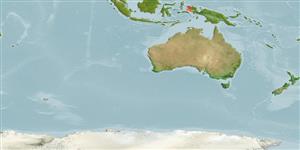>
Ovalentaria/misc (Various families in series Ovalentaria) >
Pseudochromidae (Dottybacks) > Pseudochrominae
Etymology: Pseudochromis: Greek, pseudes = false + Greek, chromis = a fish, perhaps a perch (Ref. 45335).
More on authors: Gill, Allen & Erdmann.
Environment: milieu / climate zone / depth range / distribution range
Ecologia
marinhas associadas(os) a recifes; intervalo de profundidade 10 - 45 m (Ref. 90102). Tropical; 0°S - 3°S, 130°E - 133°E
Pacific Ocean: Indonesia (endemic to the Raja Ampat Islands).
Tamanho / Peso / Idade
Maturity: Lm ? range ? - ? cm
Max length : 6.0 cm SL macho/indeterminado; (Ref. 89094)
Descrição suscinta
Chaves de identificação | Morfologia | Morfometria
Espinhos dorsais (total) : 3; Raios dorsais (total) : 24 - 25; Espinhos anais: 3; Raios anais : 14; Vértebras: 26. This species differs from other pseudochromids in having the following set of characters: D III,24-25, usually III,24; A III,14; pelvic-fin rays I,5; anterior tip of palatine tooth patch directed medially behind posterolateral arm of vomerine tooth patch; upper part of body with dark (dark grey to black in life) longitudinal stripe, when present it is extending horizontally to or towards caudal-fin base; scales in lateral series 39-43; circumpeduncular scales 20-21, usually 20 (Ref. 89094).
This species is generally found around isolated, small coral and rock outcrops in both silty and clear water reef environments, usually in about 10-45 m depth (sometimes seen as deep as 60 m). Occurs solitarily or in small loose groups, is relatively curious and easy to photograph, though it invariably retreats into crevices or under coral heads when approached too closely (Ref. 89094).
Ciclo de vida ou comportamento de acasalamento
Maturities | Reprodução | Spawnings | Egg(s) | Fecundities | Larvas
Gill, A.C., G.R. Allen and M. Erdmann, 2012. Two new species of striped Pseudochromis from the Philippine Islands and Indonesia, with a redescription of P. colei (Perciformes: Pseudochromidae). Zootaxa 3165:25-38. (Ref. 89094)
Status na Lista Vermelha da UICN (Ref. 130435)
Ameaça para os humanos
Harmless
Uso pelos humanos
Ferramentas
Relatórios especiais
Baixar XML
Fontes da internet
Estimates based on models
Preferred temperature (Ref.
123201): 27.4 - 29.1, mean 28.7 °C (based on 20 cells).
Índice de diversidade filogenética (Ref.
82804): PD
50 = 0.5000 [Uniqueness, from 0.5 = low to 2.0 = high].
Bayesian length-weight: a=0.00490 (0.00187 - 0.01281), b=3.11 (2.88 - 3.34), in cm total length, based on LWR estimates for this (Sub)family-body shape (Ref.
93245).
Nível Trófico (Ref.
69278): 3.4 ±0.5 se; based on size and trophs of closest relatives
Fishing Vulnerability (Ref.
59153): Low vulnerability (10 of 100).
Nutrients (Ref.
124155): Calcium = 191 [93, 322] mg/100g; Iron = 0.899 [0.521, 1.544] mg/100g; Protein = 18.2 [17.1, 19.3] %; Omega3 = 0.116 [0.063, 0.212] g/100g; Selenium = 26.1 [11.5, 58.2] μg/100g; VitaminA = 159 [49, 510] μg/100g; Zinc = 2.32 [1.50, 3.36] mg/100g (wet weight);
